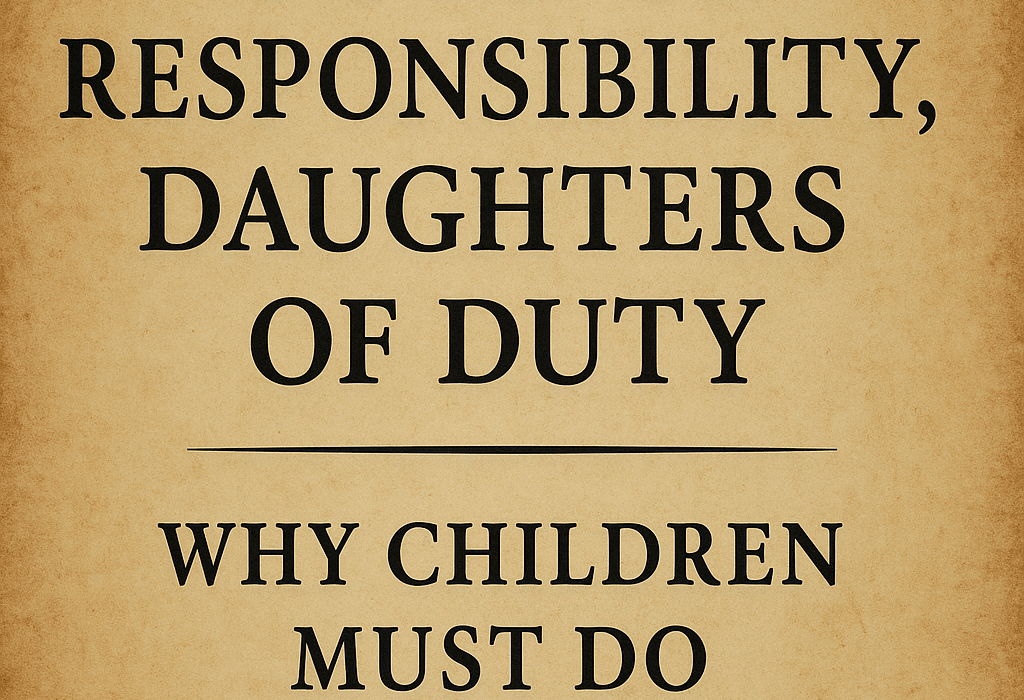In a world collapsing under the weight of entitlement and indolence, there stands one simple, potent, and often overlooked discipline that once built civilizations and now could restore them: daily chores for children.
Yes—chores. The ancient, sacred act of children participating in the labor of the household, of being given tasks not as punishment, but as preparation. In former days, this was assumed. Today, it is scandalous.
But make no mistake: the decline of children doing chores is not just a minor cultural shift—it is a root cause of social decay. Where there is no training in labor, there will be no love of labor. Where there is no love of labor, there will be no builders, only consumers. No stewards, only dependents. No leaders, only idle, effeminate men and distracted, disorderly women.
Let the modern world scoff. Let soft parents protest. Let the child psychologists complain. As for us, we will return to the ancient paths, where children labored alongside their fathers and mothers—learning duty, order, responsibility, and the ways of God.
I. God’s Design: Children as Workers Within the Household
From the earliest pages of Scripture, work is not a punishment, but a purpose. Genesis 2:15 tells us, “And the Lord God took the man, and put him into the garden of Eden to dress it and to keep it.” Before the fall, there was labor. Man was created not for luxury, but for dominion.
That dominion mandate extends to the household. A Biblical home is not a vacation resort, but a training ground—a miniature kingdom under the rule of a patriarch, where all members contribute according to their capacity.
Children are not excluded from this. Proverbs 20:11 declares, “Even a child is known by his doings, whether his work be pure, and whether it be right.” God does not consider children exempt from moral and productive labor. From their earliest years, they are to be formed in work and order.
Deuteronomy 6 commands fathers to teach the Law “diligently unto thy children,” not merely in words, but in lifestyle. And the Law included rhythms of farming, feasting, stewardship, and sacrifice. All of this required participation—daily, disciplined, dutiful involvement. Children were not idle. They labored.
II. The Decline of Chores: A Timeline of Cultural Collapse
Historically, chores were not optional. For thousands of years, children performed essential work to sustain the family economy.
In agrarian households from ancient Israel to colonial America, children were expected to rise early, tend livestock, gather wood, fetch water, weed gardens, grind grain, and more. These tasks were not busywork—they were survival.
But as industrialization took hold in the West, especially post-Industrial Revolution (circa 1760-1840), the role of the household shifted. Work moved to the factory. Families moved to cities. The household was no longer the center of production—it became a center of consumption.
By the 20th century, with the rise of public schooling, mass media, and child labor laws (many of them necessary in abusive contexts but overextended), children were increasingly detached from real, meaningful work. In 1900, over 80% of American children did regular household chores. By 1970, that number had dropped below 50%. Today, less than 30% of children in the United States are assigned consistent, daily chores (Pew Research Center, 2019).
And the consequences are devastating.
III. What the Research Says: Work Builds Character
Modern psychological and sociological studies confirm what Scripture has always taught: children need work to mature.
A long-term study by the University of Minnesota found that the single best predictor of adult success—financial, relational, and emotional—was whether that child had done chores regularly beginning by age 3 or 4 (Rossmann, 2002). Not IQ. Not athleticism. Not schooling. Chores.
Harvard University’s Center on the Developing Child notes that “responsibility-based training” such as chores builds executive function skills: impulse control, time management, problem-solving, and resilience. These are precisely the skills modern young people lack.
Dr. Marty Rossmann’s research showed that children who had regular chores were more likely to have successful careers, strong marriages, and avoid drug use and entitlement attitudes.
Why? Because work humbles. It grounds. It shapes the soul to obey reality. In doing dishes, scrubbing floors, and feeding chickens, children learn that the world is not about them. They learn to serve, to sweat, and to obey. This is sanctification in miniature.
IV. Biblical Examples: Training Through Task
Joseph learned administration not in Pharaoh’s court, but in his father’s fields. David became a man after God’s own heart while watching sheep and defending them from lions. Ruth’s character was proven in the fields of Boaz. Jesus Himself—God incarnate—was not spared work. Mark 6:3 refers to Him as “the carpenter.” He learned labor under Joseph before teaching doctrine in the synagogue.
This is not accidental. God’s pattern is always to prepare leaders through labor. Chores are not beneath a child—they are essential to their exaltation.
Proverbs 22:6 commands us to “Train up a child in the way he should go.” Training is not lecturing. It is forming. It is discipline. It is day after day of doing. And it includes work. Proverbs 12:11 adds, “He that tilleth his land shall be satisfied with bread: but he that followeth vain persons is void of understanding.” Children who are not trained in real labor will follow vain persons—and they do. They follow influencers, gamers, celebrities. Why? Because they were not taught to work.
V. The Modern Rebellion: Why Parents No Longer Require Chores
Several lies have infected modern parenting, each contributing to the erosion of work ethic in children.
1. “Let them be children.”
This sentimental lie separates play from responsibility. But in Biblical cultures, children were expected to contribute early—not crushed under burdens, but trained into productivity.
2. “They’ll learn later.”
No, they won’t. Habits form early. Waiting until 16 to teach work is like planting seed in winter. Proverbs 13:24 warns that “he who spares the rod hates his son.” Neglecting discipline—whether correction or chore—is hatred disguised as love.
3. “I don’t want them to feel burdened.”
Burden is not the enemy. Sin is. Sloth is. Pride is. Our ancestors survived famines, plagues, wars, and exile. Today’s children weep when told to vacuum. This is shameful.
VI. The Choreless Generation: Cultural Consequences
The decline of childhood labor has led to a generation unfit to lead, unable to serve, and unwilling to sacrifice.
- Entitlement replaces gratitude. If a child never labors for anything, he will expect everything.
- Laziness replaces initiative. If a child is not expected to finish a task, he will never start one without being begged.
- Rebellion replaces obedience. If a child never submits to chore commands, he will not submit to divine commands.
A 2022 study from Psychology Today found that over 70% of college students suffer from “learned helplessness”—the belief that they cannot change their situation or do hard things. These are the fruit of choreless homes.
Historically, societies that neglected work collapsed. Ancient Rome, during its decline, turned from disciplined agriculture and civic service to bread, circuses, and dependency. So too in modern America, where young adults are more likely to be living at home, playing video games, and avoiding responsibility than starting families, working the land, or building households.
VII. The Household Economy: Chores as Economic Training
Biblical households are economic engines. As we’ve noted in The Great Order, the family was not merely for emotional comfort—it was the unit of production, inheritance, and dominion.
Daily chores are the first taste of this. They teach a child that his hands matter. That his labor contributes. That his existence has weight.
- Boys should learn to chop wood, mow fields, stack hay, clean barns, fix fences, build shelves, wash tools.
- Girls should learn to cook, clean, sew, garden, organize, care for siblings, and manage the home.
These are not outdated roles—they are divinely ordered. Titus 2:4–5 calls young women to be “keepers at home.” 1 Thessalonians 4:11 commands men to “work with your own hands.”
Children who do chores are being inducted into this sacred economy. They are not slaves. They are sons and daughters—learning to rule their future domains.
VIII. Restoring the Chore: Practical Steps for the Patriarch
How can you restore this divine order in your home? Here are ten actionable principles:
- Start young. Even a two-year-old can put toys away.
- Be consistent. Daily chores must be daily. Random tasks do not build discipline.
- Tie chores to identity, not rewards. Avoid bribing. Instead, say: “You are a son in this house. Sons serve.”
- Model the work. Let them see you labor joyfully. There is glory in sweat.
- Increase difficulty over time. Don’t baby teenagers. Prepare them for dominion.
- Train before you command. Teach how to sweep before assigning sweeping.
- Connect it to Scripture. Regularly quote verses like Colossians 3:23: “Whatsoever ye do, do it heartily, as to the Lord.”
- Honor their work. Praise a job well done. Not with rewards, but with recognition.
- Correct laziness immediately. Sloth is sin. Tolerating it is fatherly failure.
- Link chores to calling. Remind them: “This is how God prepares you for leadership.”
IX. The Fruit of Labor: From Households to Nations
The patriarch who trains his children in daily labor is doing more than running a tidy home. He is raising civilization builders. The world may laugh—but when their towers fall and their youth collapse under fragility, it will be the disciplined sons and daughters of order who rise to lead.
Let us not aim merely for clean floors. Let us aim for clean hearts—hearts trained by work, shaped by order, and anchored in the fear of God.
X. Conclusion: Let the Children Rise
The Great Order is not built on theories, but on actions. And the first battlefield is the home. Daily chores are weapons in this war for culture. They are tools of sanctification. Instruments of wisdom. Pathways to dominion.
When children rise early, perform their tasks with diligence, and return to the table satisfied with honest labor, the Kingdom advances.
Let them scrub. Let them plant. Let them fold. Let them serve.
And let the fathers not grow weary in training them. For in due season, we shall reap—if we faint not.
“For even the Son of man came not to be ministered unto, but to minister…” – Mark 10:45
If the Lord Himself embraced labor, how dare we withhold it from our sons and daughters?
Let the choreless generation be replaced by a chosen generation—trained, tested, and triumphant.
Let the Great Order rise.
Soli Deo Gloria.







